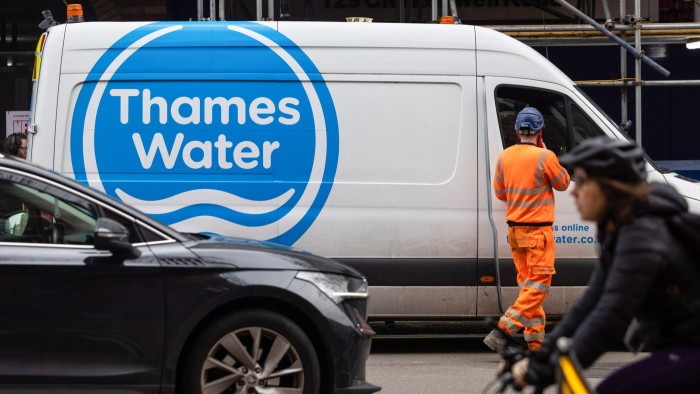Thames Water could incur more than £800mn in interest and other costs on its planned £3bn emergency loan that analysts warn will hit customers by depleting cash for key infrastructure improvements.
Britain’s largest water utility, which is already struggling under a £19bn debt mountain, said on Wednesday that it had approval from a majority of its lenders to take out a new £3bn loan.
The additional debt, which will require approval in the courts, is intended to prevent the company running out of cash just after Christmas and being renationalised under the UK government’s special administration process.
But the debt comes with a headline interest rate of 9.75 per cent and nearly £200mn in fees and other sweeteners that could take the total costs to more than £800mn in total over the 2.5-year life of the loan, according to infrastructure finance specialist Scientific Infrastructure and Assets.
Tim Whittaker, research director at SIA, said that the loan when fully drawn would add nearly £300mn of annual interest expense and have a “significant impact on its 16mn customer bills”.
“This will have a clear impact on customers as paying the higher interest on debt will hurt Thames’ ability to invest in its business and siphon resources from the company to the lenders,” he added.
The loan is piling pressure on Prime Minister Sir Keir Starmer to take control of the company, which provides water and sewerage services to 16mn customers, in London and surrounding areas.
Starmer’s Labour government, which was elected in July, has so far insisted that it will not renationalise Thames Water, instead favouring a private-sector solution to its problems.
Sarah Olney, Liberal Democrat MP, urged the government to block the “poor deal” and accept that the water company had finally reached the threshold to enter special administration, a form of renationalisation.
“The deal on the table is a short-term fix which will further entrench Thames Water in debt — at the expense of the company, Thames Water customers and UK taxpayers,” she said.
The group of top-ranking Thames bondholders that is offering the £3bn loan includes US hedge funds such as Elliott Management as well as large asset managers such as M&G.
People close to the group argued the interest on the new loans would be funded by a portion of the debt itself rather than customer bills, a move that makes the facility bigger than it otherwise would be.
They also argued that Thames is expected to write down part of its overall debt in a future restructuring and the larger interest bill would lead to a bigger haircut for lenders, rather than hitting customers.
However, Whittaker said that “if the company has to pay a lot more interest then that reduces the ability to use the cash for other alternative uses such as investment to reduce sewage overflows or network improvements”.
The loan is intended to keep Thames going until it can raise at least £3bn in equity from fresh investors next year and further restructure its balance sheet.
Its existing shareholders include the pension funds Omers and USS as well as the Chinese and Abu Dhabi sovereign wealth funds. They have declared the business “uninvestable” and stated their willingness to withdraw taking a potential £5bn loss.
Potential new investors are waiting on a decision from Ofwat next month over the extent to which it will allow Thames to raise customer bills before they submit final bids in January.
The company has asked Ofwat to approve a 53 per cent increase in bills by 2030. The investment bank Rothschild is running the equity raise, with final bids due to be submitted by January next year.
Adam Leaver, professor of accounting at the University of Sheffield’s Audit Reform Lab, said Thames was operating on the “flawed logic that the answer for an over-indebted company is more debt at a higher rate of interest”.
A separate group of lower ranking bondholders have made an alternative offer of £3bn debt at a lower rate of 8 per cent with significantly lower fees and different conditions. They have appointed specialist litigation law firm Quinn Emanuel to represent their interests and could challenge the proposed loan.
Whittaker argued the new loan from the higher ranking “class A” bondholders would give them greater control over the company and put them “at the head of the queue if Thames does enter special administration”.
Mike Wheeler, a former restructuring expert at KPMG, said that “serious consideration should be given to putting Thames Water into special administration ahead of a potential renationalisation of the assets, which represent essential infrastructure”.
“If the class As are going to recover their debt and all the associated costs in full, the only people who are going to pay for this are consumers — and that’s you and me,” he added
People close to the class A creditors said they expect to take a haircut on the value of their original debt in a future restructuring of Thames. Whether they make an overall profit would depend in part on the price at which they bought the original debt.
A spokesman for the creditor group said: “This is the first stage of our restructuring plan for Thames Water which aims to prevent a special administration and save UK taxpayers and bill payers billions in increased costs.”
Simon Coop, national officer for Unite the Union, urged Labour to nationalise water companies. “Until they do we will lurch from one crisis to the next with our supplies and waterways constantly degrading,” he said.
Ofwat said that higher interest costs are not directly added to customer bills, as these are agreed with the regulator based on a “notional” cost of debt rather than “the actual rates companies borrow at”.
The Department for Environment, Food & Rural Affairs said: “We are closely monitoring the situation and the company remains stable. The government is working to make the sector more investable into the decades to come.”
Thames Water declined to comment.
Read the full article here

